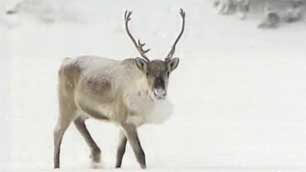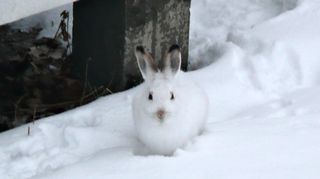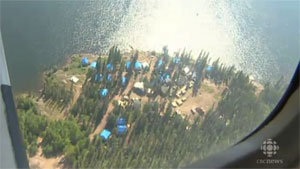Barren-ground caribou herds recovering slowly in Canada’s Northwest Territories
 Several herds are now up from 2009 numbers
Several herds are now up from 2009 numbers
Results from recent caribou surveys show barren-ground herds are slowly recovering in Canada’s Northwest Territories.
Some herds have increased in numbers, including the Cape Bathurst and Bluenose West herds.
The Bathurst herd has also grown from a record low two years ago.
“I am happy to advise that this herd, which was in rapid decline only a few short years ago has now stabilized at about 35,000, a slight increase from 32,000 in 2009,” said N.W.T. Environment Minister Michael Miltenberger.
Miltenberger said the news is good, but he is still concerned about the herd’s health.
The Bathurst herd’s size is still low — it had 350,000 caribou in 1996, and then 128,000 in 2006.
Miltenberger added that the 2012 survey results show the number of breeding females has not increased since 2009, and there have not been very many new calves.
Because of this, harvest restrictions, which were put in place in 2010, will remain in effect for this harvest season.
The Tlicho government and the Yellowknives Dene First Nation will still each get 150 tags.
Robert Hawkins, the MLA for Yellowknife Centre, wanted to know what size the different herds need to be in order for all restrictions to be lifted.
“If nobody knows what they’re working towards, nobody knows what the government is really doing on this particular issue and they assume nothing – like, they’ll never get to hunt again,” said Hawkins.
Miltenberger said they need to make those decisions with the different management boards and first nations in the caribou’s migration areas. He said other caribou management boards, such as the Porcupine Caribou Management Board, have set certain numbers as triggers – if a herd reaches a number, it triggers restrictions. If the herd recovers, then the restrictions are lifted. But he said they need to know how big the herds are before setting those numbers.
The MLA for Weledeh, Bob Bromley, called for some tags for residents for herds that are doing well.
The Tuk Peninsula herd saw a slight decrease from 2009 — from 2,700 animals to 2,200.
The department wasn’t able to survey the Bluenose East and Porcupine caribou herds due to weather. Surveys for those herds are planned for the summer of 2013.
Related Links:
Revised N.W.T. caribou plan presented, CBC News
N.W.T. drafts new caribou management plan, CBC News
For more northern stories from CBC News, click here



